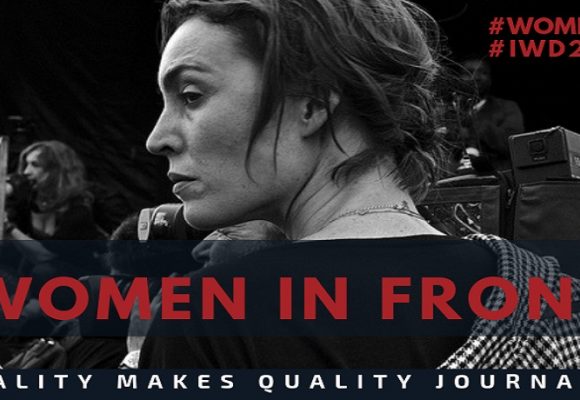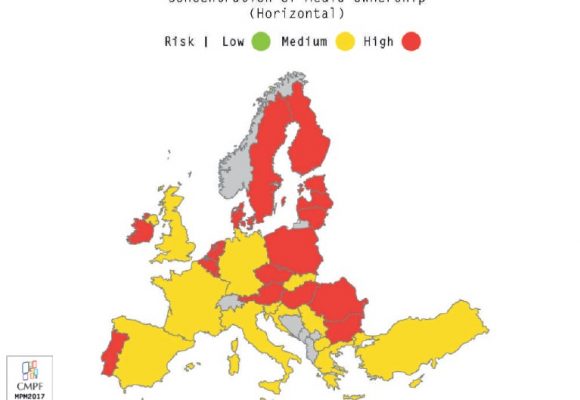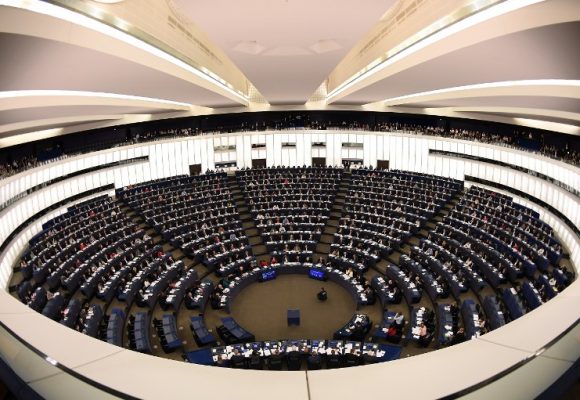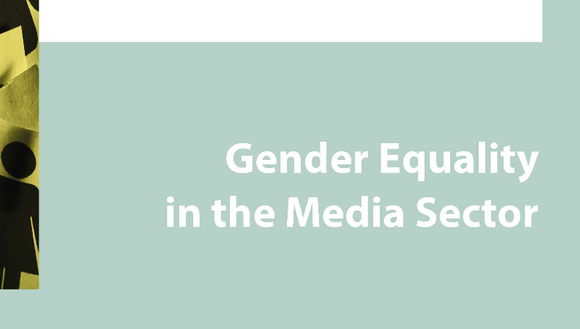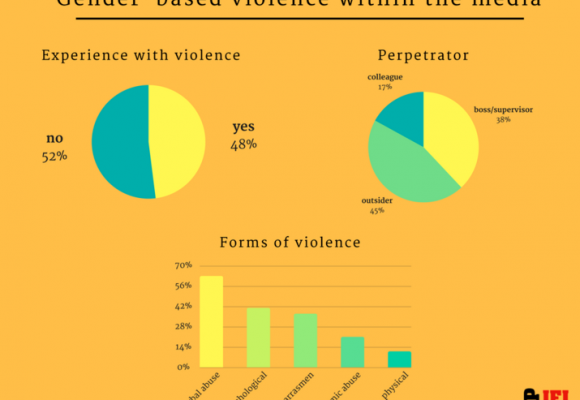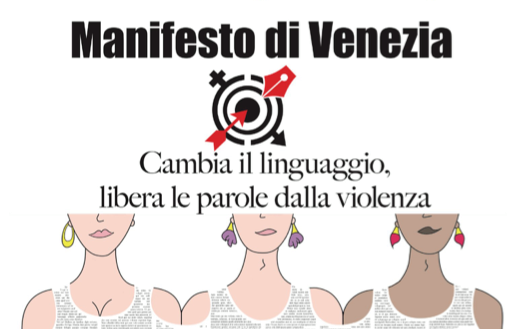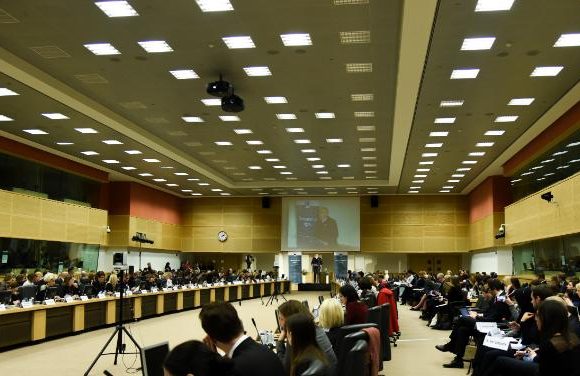#gender equality
Resources on gender equality and online violence
Around 30 journalists and journalists’ representatives from 20 European countries attended the workshop on “Increasing gender equality and diversity in the workplace” on 28 and 29 May in Istanbul, Turkey. Co-organised by the European Federation of Journalists (EFJ) and the Journalists’ Union of Turkey (TGS), the workshop aimed to provide best practices and concrete tools to improve equality between male and female journalists and to counter growing online harrassment. Programme Panel 1 – Gender equality and diversity in the workplace: what works in Europe? Presentation by Gülfem Karatas (TGS) Panel 2 – Fighting stereotypes in the news: towards better representation…
Equality for female staff in the media: we call on media leaders to take action!
Today, on International Women’s Day 2019, media and journalists’ organisations call upon all media leaders around the globe to stand up and protect the rights of female journalists, both staff and freelance. Today, on International Women’s Day 2019, we want to call upon all media leaders around the globe to stand up and protect the rights of female journalists, both staff and freelance. The facts shown by recent research are alarming. Female journalists are systematically paid less in the media industry – in the UK alone female journalists earn 17.4% less than their male colleagues. Almost a third of female…
Launch of the AGEMI project and web platform
Come and join us at the launch of the AGEMI (Advancing Gender Equality in Media Industries) project and web platform where you can find a range of useful resources focused on aspects of gender equality, including a large Resources Bank of Good Practices and learning resources which include mini-lectures and filmed interviews with media practitioners on topics such as representation, culture, policy, advocacy and leadership. Gender issues must be part of journalism education, training and editorial practices. AGEMI has piloted two activities to build links between students and the world of work through its summer school and internships. Including such…
REBALANCE Conference
Steering Committee meeting of the REBALANCE project
Third meeting of the Steering Committee for the project “REBALANCE – Trade unions’ and social partners’ actions to improve reconciliation of work, family and private life for women and men”. The meeting will take place on 8 February from 10h00 to 16h00 in the 7th floor ETUC meeting room of the ITUH.
Risks for media pluralism and safety of journalists are increasing across Europe
The Media Pluralism Monitor (MPM) has examined 28 European Union Member States as well as three candidate countries: Turkey, Serbia and Macedonia. The results of this second EU-wide implementation of the MPM show either general stagnation or deterioration in all of the major areas encompassed by the MPM and confirm that no country analysed is free from risks to media pluralism. The Centre for Media Pluralism and Media Freedom (CMPF), based in Florence, has just published its 2017 Media Pluralism Monitor reports (#MPM2017). Year 2017 was marked by events that have had a significant impact on media freedom and media…
Report calls on EU states to collaborate with journalists’ unions for gender equality
A report on “Gender Equality in the Media Sector in the EU”, passed by Members of the European Parliament (MEPs) during the plenary session in Strasbourg on 17 April 2018, calls on Member States and the European Commission to collaborate with journalists’ trade unions and media organisations to promote co-regulation in the media sector through codes of conduct. In order to safeguard and ensure gender equality, media companies are urged to draw up codes of conduct and self-regulation systems together with representatives from journalists’ trade unions. This aims to allow preventive action and impose sanctions regarding gender-based discrimination in media productions. The…
Gender inequalities in media content and production persist, new study says
The European Parliament has just published its latest study on ‘Gender Equality in the Media Sector’. The study, requested by the Committee on Women’s Rights and Gender Equality and undertaken by the Department of Citizens’ Rights and Constitutional affairs, examines representation and conditions in the media and key elements of European policy towards gender equality in the sector. It also presents case studies in Austria, Malta, Sweden, and the UK. Many women who were interviewed reported widespread discrimination and inequality of opportunities in pay, recruitment, allocation of work, and promotion. Working structures, norms and practices were also seen as advantaging…
EFJ meets MEP Rory Palmer on gender equality in the media
On 29 November 2017, the European Federation of Journalists (EFJ) met with UK Labour MEP Rory Palmer, shadow rapporteur for the European Parliament Employment and Social Affairs Committee’s Opinion on a Draft Report on gender equality in the media sector in the EU. Pamela Morinière presented the EFJ perspective on gender equality in the media and introduced the latest IFJ survey results on violence against women journalists. Rory Palmer framed the discussion around 6 main issues including the representation of women in media structures, especially in leading positions; work-life balance; working conditions and equal pay; workplace harassment; and attacks against women journalists, notably…
Manifesto of Venice against gender-based violence
The “Manifesto of Venice”, a manifesto for gender equality and correct information, will be launched on the World Day for the Elimination of Violence against Women and Girls, on 25 November 2017. Signed by 800 journalists, including directors of national newspapers in Italy, the manifesto will be launched by the EFJ affiliate in Italy, the Federazione Nazionale Stampa Italiana (FNSI) Equal Opportunities Committee (CPO). It is a result of their collaboration with the CPO of Unione Sindacale Giornalisti Rai and Giornaliste Unite Libere Autonome (GiULiA), following a proposal by the Veneto Journalists’ Union. “We, journalist signatories of the Manifesto of Venice, are…
EU’s Colloquium on Fundamental Rights addresses women and the media
The EU’s annual Colloquium on Fundamental Rights was held this year on 20-21 November 2017, with the theme of “Women’s Rights in Turbulent Times”. Discussions over the two days raised many issues around journalists and the media. Discussing the empowerment of women’s voices, Wim Slabbinck, a journalist for Charlie magazine, argued that media pushes girls into corners. “Only 7 % of sports media coverage is about women”, said Katrien Meire, owner of Charlton Athletic. In terms of coverage of female politicians, Pamela Morinière from the International Federation of Journalists (IFJ) noted that women in politics are not covered in the…
AGEMI Project Meeting
How is gender equality represented in the media in EU?
The Committee for Women’s Rights and Gender Equality (FEMM) organised on Monday (26/06/2017) a hearing on gender equality in the media in the European Union. The main goal was to provide information for the upcoming own-initiative report, which will be written later on in the year. The rapporteur is Czech MEP Michaela Šojdrová. Lenka Vochocová from Media Studies at the Faculty of Social Sciences in Prague, Donatella Martini, the director of DonneinQuota and Martine Simonis, General Secretary at the Belgian Association of Journalists (AJP) talked about the current situation of women at different positions in the media sector and analysed…
International conference to counter online abuse and harassment of female journalists
The European Federation of Journalists (EFJ), represented by its President, Mogens Blicher Bjerregård, will participate to a conference in Vienna on countering online abuse of female journalists held by the Organisation for Security and Co-operation in Europe (OSCE) Representative on Freedom of the Media in Vienna on 17 September. The conference will gather experts in the field to help increase understanding and gravity of the issues involved best practices and possible solutions to tackle the mounting number of online threats targeting female journalists. Among the EFJ members, they rarely received reports of harassment by journalists and the problem is not widely…


